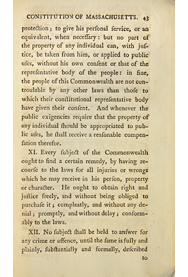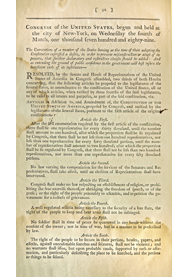Magna Carta and the Constitution
The Framers of the Constitution, and particularly the drafters of the Bill of Rights, took cognizance of portions of Magna Carta, and were strongly indebted to a long English and colonial legal heritage. A number of the provisions in the US Bill of Rights had first been included in state constitutions, and were carried into the federal document without great change. Articles 11 and 12 of the Massachusetts's Constitution of 1780, for example, provided for justice without delay or denial, and stipulated that no one should be deprived of life, liberty or property without the "judgment of peers" or "the law of the land." These corresponded to clauses 40 and 39 of John's Magna Carta. The same clauses of the Massachusetts document also forbade imprisonment without charge, which affirmed habeas corpus and echoed the English Petition of Right.
What became the Fifth Amendment includes the most lasting cornerstone of Magna Carta: there should be no loss of life, liberty or property without the "due process of law." The US Bill of Rights also echoed the English Bill of Rights in several provisions, and expanded its scope to address issues that had become centrally important to eighteenth-century colonists, including free speech and a free press, free assembly and freedom of religion.
The prohibition against unreasonable search and seizure, described in the Fourth Amendment, responded to the broad English warrants that American colonists like James Otis - and Englishmen like John Wilkes - had deplored. That constitutional prohibition likewise found an early source in Magna Carta. On the foundation of English due process, the Fifth Amendment guarantees the right to criminal trials that are "speedy and public" and tried by "impartial jury," while the Eighth Amendment forbids excessive fines and cruel and unusual punishments. These, too, have direct roots in the English Bill of Rights and Magna Carta.
![Title page of [Book title start] Articles of Confederation and Perpetual Union Between the States of ... [Book title end].](../riesenfeld_images/magnacarta/images/xxxArticlesofConfederationPS002thumbxx.png)
![Title page of [Book title start] An Address of the Convention, for Framing a New Constitution of Government, for the State of Massachusetts-Bay [Book title end].](../riesenfeld_images/magnacarta/images/xxxConFrameMABay1780thumbx.png)



![Title page of [Book title start] Debates and Other Proceedings of the Convention of Virginia [Book title end].](../riesenfeld_images/magnacarta/images/xDebateVA1788thumbx.png)
![Title page of [Publication title start] Acts passed at a Congress of the United States of America [Publication title end].](../riesenfeld_images/magnacarta/images/xxxUSSessionLawsTPPSthumbx.png)

